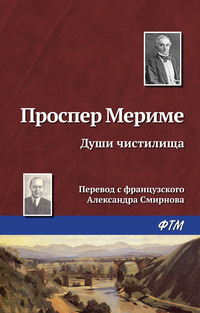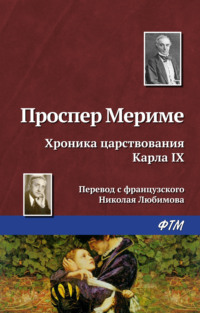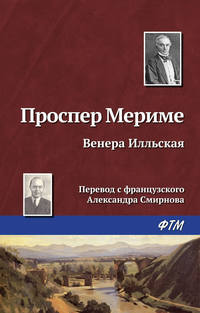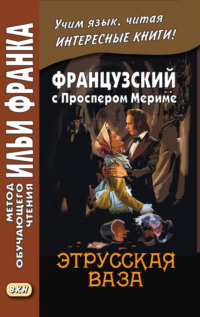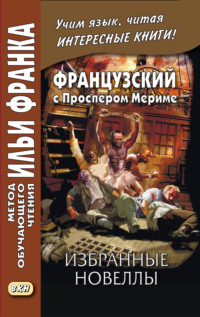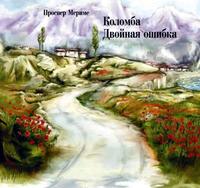 полная версия
полная версияCarmen
“Our gang, which consisted of eight or ten men, was hardly ever together except at decisive moments, and we were usually scattered by twos and threes about the towns and villages. Each one of us pretended to have some trade. One was a tinker, another was a groom; I was supposed to peddle haberdashery, but I hardly ever showed myself in large places, on account of my unlucky business at Seville. One day, or rather one night, we were to meet below Veger. El Dancaire and I got there before the others.
“‘We shall soon have a new comrade,’ said he. ‘Carmen has just managed one of her best tricks. She has contrived the escape of her rom, who was in the presidio at Tarifa.’
“I was already beginning to understand the gipsy language, which nearly all my comrades spoke, and this word rom startled me.
“What! her husband? Is she married, then?’ said I to the captain.
“‘Yes!’ he replied, ‘married to Garcia el Tuerto34—as cunning a gipsy as she is herself. The poor fellow has been at the galleys. Carmen has wheedled the surgeon of the presidio to such good purpose that she has managed to get her rom out of prison. Faith! that girl’s worth her weight in gold. For two years she has been trying to contrive his escape, but she could do nothing until the authorities took it into their heads to change the surgeon. She soon managed to come to an understanding with this new one.’
“You may imagine how pleasant this news was for me. I soon saw Garcia el Tuerto. He was the very ugliest brute that was ever nursed in gipsydom. His skin was black, his soul was blacker, and he was altogether the most thorough-paced ruffian I ever came across in my life. Carmen arrived with him, and when she called him her rom in my presence, you should have seen the eyes she made at me, and the faces she pulled whenever Garcia turned his head away.
“I was disgusted, and never spoke a word to her all night. The next morning we had made up our packs, and had already started, when we became aware that we had a dozen horsemen on our heels. The braggart Andalusians, who had been boasting they would murder every one who came near them, cut a pitiful figure at once. There was a general rout. El Dancaire, Garcia, a good-looking fellow from Ecija, who was called El Remendado, and Carmen herself, kept their wits about them. The rest forsook the mules and took to the gorges, where the horses could not follow them. There was no hope of saving the mules, so we hastily unstrapped the best part of our booty, and taking it on our shoulders, we tried to escape through the rocks down the steepest of the slopes. We threw our packs down in front of us and followed them as best we could, slipping along on our heels. Meanwhile the enemy fired at us. It was the first time I had ever heard bullets whistling around me and I didn’t mind it very much. When there’s a woman looking on, there’s no particular merit in snapping one’s fingers at death. We all escaped except the poor Remendado, who received a bullet wound in the loins. I threw away my pack and tried to lift him up.
“‘Idiot!’ shouted Garcia, ‘what do we want with offal! Finish him off, and don’t lose the cotton stockings!’
“‘Drop him!’ cried Carmen.
“I was so exhausted that I was obliged to lay him down for a moment under a rock. Garcia came up, and fired his blunderbuss full into his face. ‘He’d be a clever fellow who recognised him now!’ said he, as he looked at the face, cut to pieces by a dozen slugs.
“There, sir; that’s the delightful sort of life I’ve led! That night we found ourselves in a thicket, worn out with fatigue, with nothing to eat, and ruined by the loss of our mules. What do you think that devil Garcia did? He pulled a pack of cards out of his pocket and began playing games with El Dancaire by the light of a fire they kindled. Meanwhile I was lying down, staring at the stars, thinking of El Remendado, and telling myself I would just as lief be in his place. Carmen was squatting down near me, and every now and then she would rattle her castanets and hum a tune. Then, drawing close to me, as if she would have whispered in my ear, she kissed me two or three times over almost against my will.
“‘You are a devil,’ said I to her.
“‘Yes,’ she replied.
“After a few hours’ rest, she departed to Gaucin, and the next morning a little goatherd brought us some food. We stayed there all that day, and in the evening we moved close to Gaucin. We were expecting news from Carmen, but none came. After daylight broke we saw a muleteer attending a well-dressed woman with a parasol, and a little girl who seemed to be her servant. Said Garcia, ‘There go two mules and two women whom St. Nicholas has sent us. I would rather have had four mules, but no matter. I’ll do the best I can with these.’
“He took his blunderbuss, and went down the pathway, hiding himself among the brushwood.
“We followed him, El Dancaire and I keeping a little way behind. As soon as the woman saw us, instead of being frightened—and our dress would have been enough to frighten any one—she burst into a fit of loud laughter. ‘Ah! the lillipendi! They take me for an erani!’ 35
“It was Carmen, but so well disguised that if she had spoken any other language I should never have recognised her. She sprang off her mule, and talked some time in an undertone with El Dancaire and Garcia. Then she said to me:
“‘Canary-bird, we shall meet again before you’re hanged. I’m off to Gibraltar on gipsy business—you’ll soon have news of me.’
“We parted, after she had told us of a place where we should find shelter for some days. That girl was the providence of our gang. We soon received some money sent by her, and a piece of news which was still more useful to us—to the effect that on a certain day two English lords would travel from Gibraltar to Granada by a road she mentioned. This was a word to the wise. They had plenty of good guineas. Garcia would have killed them, but El Dancaire and I objected. All we took from them, besides their shirts, which we greatly needed, was their money and their watches.
“Sir, a man may turn rogue in sheer thoughtlessness. You lose your head over a pretty girl, you fight another man about her, there is a catastrophe, you have to take to the mountains, and you turn from a smuggler into a robber before you have time to think about it. After this matter of the English lords, we concluded that the neighbourhood of Gibraltar would not be healthy for us, and we plunged into the Sierra de Ronda. You once mentioned Jose-Maria to me. Well, it was there I made acquaintance with him. He always took his mistress with him on his expeditions. She was a pretty girl, quiet, modest, well-mannered, you never heard a vulgar word from her, and she was quite devoted to him. He, on his side, led her a very unhappy life. He was always running after other women, he ill-treated her, and then sometimes he would take it into his head to be jealous. One day he slashed her with a knife. Well, she only doted on him the more! That’s the way with women, and especially with Andalusians. This girl was proud of the scar on her arm, and would display it as though it were the most beautiful thing in the world. And then Jose-Maria was the worst of comrades in the bargain. In one expedition we made with him, he managed so that he kept all the profits, and we had all the trouble and the blows. But I must go back to my story. We had no sign at all from Carmen. El Dancaire said: ‘One of us will have to go to Gibraltar to get news of her. She must have planned some business. I’d go at once, only I’m too well known at Gibraltar.’ El Tuerto said:
“‘I’m well known there too. I’ve played so many tricks on the crayfish36—and as I’ve only one eye, it is not overeasy for me to disguise myself.’
“‘Then I suppose I must go,’ said I, delighted at the very idea of seeing Carmen again. ‘Well, how am I to set about it?’
“The others answered:
“‘You must either go by sea, or you must get through by San Rocco, whichever you like the best; once you are in Gibraltar, inquire in the port where a chocolate-seller called La Rollona lives. When you’ve found her, she’ll tell you everything that’s happening.’
“It was settled that we were all to start for the Sierra, that I was to leave my two companions there, and take my way to Gibraltar, in the character of a fruit-seller. At Ronda one of our men procured me a passport; at Gaucin I was provided with a donkey. I loaded it with oranges and melons, and started forth. When I reached Gibraltar I found that many people knew La Rollona, but that she was either dead or had gone ad finibus terroe,37 and, to my mind, her disappearance explained the failure of our correspondence with Carmen. I stabled my donkey, and began to move about the town, carrying my oranges as though to sell them, but in reality looking to see whether I could not come across any face I knew. The place is full of ragamuffins from every country in the world, and it really is like the Tower of Babel, for you can’t go ten paces along a street without hearing as many languages. I did see some gipsies, but I hardly dared confide in them. I was taking stock of them, and they were taking stock of me. We had mutually guessed each other to be rogues, but the important thing for us was to know whether we belonged to the same gang. After having spent two days in fruitless wanderings, and having found out nothing either as to La Rollona or as to Carmen, I was thinking I would go back to my comrades as soon as I had made a few purchases, when, toward sunset, as I was walking along a street, I heard a woman’s voice from a window say, ‘Orange-seller!’
“I looked up, and on a balcony I saw Carmen looking out, beside a scarlet-coated officer with gold epaulettes, curly hair, and all the appearance of a rich milord. As for her, she was magnificently dressed, a shawl hung on her shoulders, she’d a gold comb in her hair, everything she wore was of silk; and the cunning little wretch, not a bit altered, was laughing till she held her sides.
“The Englishman shouted to me in mangled Spanish to come upstairs, as the lady wanted some oranges, and Carmen said to me in Basque:
“‘Come up, and don’t look astonished at anything!’
“Indeed, nothing that she did ought ever to have astonished me. I don’t know whether I was most happy or wretched at seeing her again. At the door of the house there was a tall English servant with a powdered head, who ushered me into a splendid drawing-room. Instantly Carmen said to me in Basque, ‘You don’t know one word of Spanish, and you don’t know me.’ Then turning to the Englishman, she added:
“‘I told you so. I saw at once he was a Basque. Now you’ll hear what a queer language he speaks. Doesn’t he look silly? He’s like a cat that’s been caught in the larder!’
“‘And you,’ said I to her in my own language, ‘you look like an impudent jade—and I’ve a good mind to scar your face here and now, before your spark.’
“‘My spark!’ said she. ‘Why, you’ve guessed that all alone! Are you jealous of this idiot? You’re even sillier than you were before our evening in the Calle del Candilejo! Don’t you see, fool, that at this moment I’m doing gipsy business, and doing it in the most brilliant manner? This house belongs to me—the guineas of that crayfish will belong to me! I lead him by the nose, and I’ll lead him to a place that he’ll never get out of!’
“‘And if I catch you doing any gipsy business in this style again, I’ll see to it that you never do any again!’ said I.
“‘Ah! upon my word! Are you my rom, pray that you give me orders? If El Tuerto is pleased, what have you to do with it? Oughtn’t you to be very happy that you are the only man who can call himself my minchorro?’ 38
“‘What does he say?’ inquired the Englishman.
“‘He says he’s thirsty, and would like a drink,’ answered Carmen, and she threw herself back upon a sofa, screaming with laughter at her own translation.
“When that girl begins to laugh, sir, it was hopeless for anybody to try and talk sense. Everybody laughed with her. The big Englishman began to laugh too, like the idiot he was, and ordered the servant to bring me something to drink.
“While I was drinking she said to me:
“‘Do you see that ring he has on his finger? If you like I’ll give it to you.’
“And I answered:
“‘I would give one of my fingers to have your milord out on the mountains, and each of us with a maquila in his fist.’
“‘Maquila, what does that mean?’ asked the Englishman.
“‘Maquila,’ said Carmen, still laughing, ‘means an orange. Isn’t it a queer word for an orange? He says he’d like you to eat maquila.’
“‘Does he?’ said the Englishman. ‘Very well, bring more maquila to-morrow.’
“While we were talking a servant came in and said dinner was ready. Then the Englishman stood up, gave me a piastre, and offered his arm to Carmen, as if she couldn’t have walked alone. Carmen, who was still laughing, said to me:
“‘My boy, I can’t ask you to dinner. But to-morrow, as soon as you hear the drums beat for parade, come here with your oranges. You’ll find a better furnished room than the one in the Calle del Candilejo, and you’ll see whether I am still your Carmencita. Then afterwards we’ll talk about gipsy business.’
“I gave her no answer—even when I was in the street I could hear the Englishman shouting, ‘Bring more maquila to-morrow,’ and Carmen’s peals of laughter.
“I went out, not knowing what I should do; I hardly slept, and next morning I was so enraged with the treacherous creature that I made up my mind to leave Gibraltar without seeing her again. But the moment the drums began to roll, my courage failed me. I took up my net full of oranges, and hurried off to Carmen’s house. Her window-shutters had been pulled apart a little, and I saw her great dark eyes watching for me. The powdered servant showed me in at once. Carmen sent him out with a message, and as soon as we were alone she burst into one of her fits of crocodile laughter and threw her arms around my neck. Never had I seen her look so beautiful. She was dressed out like a queen, and scented; she had silken furniture, embroidered curtains—and I togged out like the thief I was!
“‘Minchorro,’ said Carmen, ‘I’ve a good mind to smash up everything here, set fire to the house, and take myself off to the mountains.’ And then she would fondle me, and then she would laugh, and she danced about and tore up her fripperies. Never did monkey gambol nor make such faces, nor play such wild tricks, as she did that day. When she had recovered her gravity—
“‘Hark!’ she said, ‘this is gipsy business. I mean him to take me to Ronda, where I have a sister who is a nun’ (here she shrieked with laughter again). ‘We shall pass by a particular spot which I shall make known to you. Then you must fall upon him and strip him to the skin. Your best plan would be to do for him, but,’ she added, with a certain fiendish smile of hers, which no one who saw it ever had any desire to imitate, ‘do you know what you had better do? Let El Tuerto come up in front of you. You keep a little behind. The crayfish is brave, and skilful too, and he has good pistols. Do you understand?’
“And she broke off with another fit of laughter that made me shiver.
“‘No,’ said I, ‘I hate Garcia, but he’s my comrade. Some day, maybe, I’ll rid you of him, but we’ll settle our account after the fashion of my country. It’s only chance that has made me a gipsy, and in certain things I shall always be a thorough Navarrese,39 as the proverb says.
“‘You’re a fool,’ she rejoined, ‘a simpleton, a regular payllo. You’re just like the dwarf who thinks himself tall because he can spit a long way.40 You don’t love me! Be off with you!’
“Whenever she said to me ‘Be off with you,” I couldn’t go away. I promised I would start back to my comrades and wait the arrival of the Englishman. She, on her side, promised she would be ill until she left Gibraltar for Ronda.
“I remained at Gibraltar two days longer. She had the boldness to disguise herself and come and see me at the inn. I departed, I had a plan of my own. I went back to our meeting-place with the information as to the spot and the hour at which the Englishman and Carmen were to pass by. I found El Dancaire and Garcia waiting for me. We spent the night in a wood, beside a fire made of pine-cones that blazed splendidly. I suggested to Garcia that we should play cards, and he agreed. In the second game I told him he was cheating; he began to laugh; I threw the cards in his face. He tried to get at his blunderbuss. I set my foot on it, and said, ‘They say you can use a knife as well as the best ruffian in Malaga; will you try it with me?’ El Dancaire tried to part us. I had given Garcia one or two cuffs, his rage had given him courage, he drew his knife, and I drew mine. We both of us told El Dancaire he must leave us alone, and let us fight it out. He saw there was no means of stopping us, so he stood on one side. Garcia was already bent double, like a cat ready to spring upon a mouse. He held his hat in his left hand to parry with, and his knife in front of him—that’s their Andalusian guard. I stood up in the Navarrese fashion, with my left arm raised, my left leg forward, and my knife held straight along my right thigh. I felt I was stronger than any giant. He flew at me like an arrow. I turned round on my left foot, so that he found nothing in front of him. But I thrust him in the throat, and the knife went in so far that my hand was under his chin. I gave the blade such a twist that it broke. That was the end. The blade was carried out of the wound by a gush of blood as thick as my arm, and he fell full length on his face.
“‘What have you done?’ said El Dancaire to me.
“‘Hark ye,’ said I, ‘we couldn’t live on together. I love Carmen and I mean to be the only one. And besides, Garcia was a villain. I remember what he did to that poor Remendado. There are only two of us left now, but we are both good fellows. Come, will you have me for your friend, for life or death?’
“El Dancaire stretched out his hand. He was a man of fifty.
“‘Devil take these love stories!’ he cried. ‘If you’d asked him for Carmen he’d have sold her to you for a piastre! There are only two of us now—how shall we manage for to-morrow?’
“‘I’ll manage it all alone,’ I answered. ‘I can snap my fingers at the whole world now.’
“We buried Garcia, and we moved our camp two hundred paces farther on. The next morning Carmen and her Englishman came along with two muleteers and a servant. I said to El Dancaire:
“‘I’ll look after the Englishman, you frighten the others—they’re not armed!’
“The Englishman was a plucky fellow. He’d have killed me if Carmen hadn’t jogged his elbow.
“To put it shortly, I won Carmen back that day, and my first words were to tell her she was a widow.
“When she knew how it had all happened—
“‘You’ll always be a lillipendi,’ she said. ‘Garcia ought to have killed you. Your Navarrese guard is a pack of nonsense, and he has sent far more skilful men than you into the darkness. It was just that his time had come—and yours will come too.’
“‘Ay, and yours too!—if you’re not a faithful romi to me.’
“‘So be it,’ said she. ‘I’ve read in the coffee grounds, more than once, that you and I were to end our lives together. Pshaw! what must be, will be!’ and she rattled her castanets, as was her way when she wanted to drive away some worrying thought.
“One runs on when one is talking about one’s self. I dare say all these details bore you, but I shall soon be at the end of my story. Our new life lasted for some considerable time. El Dancaire and I gathered a few comrades about us, who were more trustworthy than our earlier ones, and we turned our attention to smuggling. Occasionally, indeed, I must confess we stopped travellers on the highways, but never unless we were at the last extremity, and could not avoid doing so; and besides, we never ill-treated the travellers, and confined ourselves to taking their money from them.
“For some months I was very well satisfied with Carmen. She still served us in our smuggling operations, by giving us notice of any opportunity of making a good haul. She remained either at Malaga, at Cordova, or at Granada, but at a word from me she would leave everything, and come to meet me at some venta or even in our lonely camp. Only once—it was at Malaga—she caused me some uneasiness. I heard she had fixed her fancy upon a very rich merchant, with whom she probably proposed to play her Gibraltar trick over again. In spite of everything El Dancaire said to stop me, I started off, walked into Malaga in broad daylight, sought for Carmen and carried her off instantly. We had a sharp altercation.
“‘Do you know,’ said she, ‘now that you’re my rom for good and all, I don’t care for you so much as when you were my minchorro! I won’t be worried, and above all, I won’t be ordered about. I choose to be free to do as I like. Take care you don’t drive me too far; if you tire me out, I’ll find some good fellow who’ll serve you just as you served El Tuerto.’
“El Dancaire patched it up between us; but we had said things to each other that rankled in our hearts, and we were not as we had been before. Shortly after that we had a misfortune: the soldiers caught us, El Dancaire and two of my comrades were killed; two others were taken. I was sorely wounded, and, but for my good horse, I should have fallen into the soldiers’ hands. Half dead with fatigue, and with a bullet in my body, I sought shelter in a wood, with my only remaining comrade. When I got off my horse I fainted away, and I thought I was going to die there in the brushwood, like a shot hare. My comrade carried me to a cave he knew of, and then he sent to fetch Carmen.
“She was at Granada, and she hurried to me at once. For a whole fortnight she never left me for a single instant. She never closed her eyes; she nursed me with a skill and care such as no woman ever showed to the man she loved most tenderly. As soon as I could stand on my feet, she conveyed me with the utmost secrecy to Granada. These gipsy women find safe shelter everywhere, and I spent more than six weeks in a house only two doors from that of the Corregidor who was trying to arrest me. More than once I saw him pass by, from behind the shutter. At last I recovered, but I had thought a great deal, on my bed of pain, and I had planned to change my way of life. I suggested to Carmen that we should leave Spain, and seek an honest livelihood in the New World. She laughed in my face.
“‘We were not born to plant cabbages,’ she cried. ‘Our fate is to live payllos! Listen: I’ve arranged a business with Nathan Ben-Joseph at Gibraltar. He has cotton stuffs that he can not get through till you come to fetch them. He knows you’re alive, and reckons upon you. What would our Gibraltar correspondents say if you failed them?’
“I let myself by persuaded, and took up my vile trade once more.
“While I was hiding at Granada there were bull-fights there, to which Carmen went. When she came back she talked a great deal about a skilful picador of the name of Lucas. She knew the name of his horse, and how much his embroidered jacket had cost him. I paid no attention to this; but a few days later, Juanito, the only one of my comrades who was left, told me he had seen Carmen with Lucas in a shop in the Zacatin. Then I began to feel alarmed. I asked Carmen how and why she had made the picador’s acquaintance.
“‘He’s a man out of whom we may be able to get something,’ said she. ‘A noisy stream has either water in it or pebbles. He has earned twelve hundred reals at the bull-fights. It must be one of two things: we must either have his money, or else, as he is a good rider and a plucky fellow, we can enroll him in our gang. We have lost such an one an such an one; you’ll have to replace them. Take this man with you!’
“‘I want neither his money nor himself,’ I replied, ‘and I forbid you to speak to him.’
“‘Beware!’ she retorted. ‘If any one defies me to do a thing, it’s very quickly done.’




